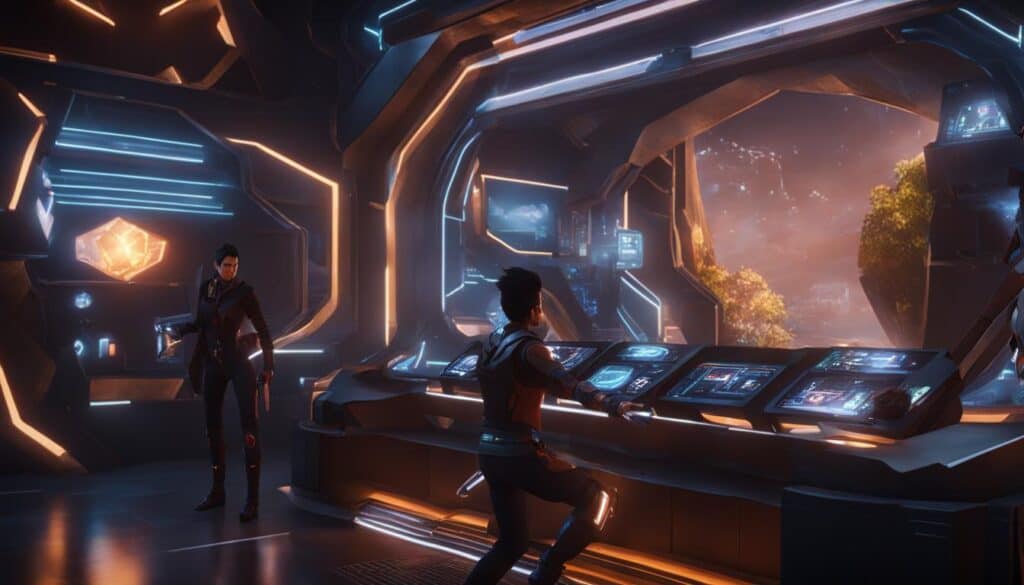Artificial intelligence (AI) is revolutionizing the gaming industry, transforming the way games are developed, played, and experienced. From creating immersive virtual worlds to enhancing gameplay features, AI is shaping the future of gaming in exciting ways. In this article, we’ll explore the impact of AI in video games and the latest trends in AI game development.
Key Takeaways:
- Gaming AI is revolutionizing the industry and bringing new possibilities for players.
- AI algorithms improve gameplay by providing realistic interactions with non-player characters.
- Advancements in AI game development include realistic physics simulations and dynamic narratives.
- Procedural generation using AI allows for endless possibilities in game content creation.
- AI-powered virtual assistants enhance the gaming experience and provide personalized guidance.
The Importance of AI in Gaming

AI has become an integral part of the gaming industry, revolutionizing the way games are developed and played. It plays a vital role in enhancing the gameplay experience by providing realistic and dynamic interactions with non-player characters (NPCs). With AI algorithms, game developers can analyze player behavior, adapt to their actions, and create more challenging and immersive gaming environments.
One of the key roles of AI in gaming is to enable the creation of intelligent virtual opponents. These opponents can learn and adapt to different game scenarios, making the game more competitive and engaging for players. By incorporating AI-driven virtual opponents, game developers can provide players with unique and personalized gaming experiences.
In addition to enhancing gameplay, AI also contributes to the development of more sophisticated and lifelike gaming experiences. The field of AI game development is evolving rapidly, with developers utilizing advanced AI algorithms and techniques. Deep learning algorithms are being used to train AI-driven characters, allowing them to learn and adapt to different game scenarios. This leads to the creation of virtual worlds, realistic physics simulations, and dynamic game narratives.
AI in gaming:
- Provides realistic and dynamic interactions with NPCs
- Creates intelligent virtual opponents for more competitive gameplay
- Enables the development of sophisticated and lifelike gaming experiences
- Utilizes deep learning algorithms for training AI-driven characters
Role of AI in video games:
“AI enhances the gameplay experience by providing realistic interactions, creating virtual opponents, and contributing to the development of more immersive gaming experiences.”
Advancements in AI Game Development

The field of AI game development is constantly evolving, pushing the boundaries of what is possible in the gaming industry. Developers are harnessing the power of advanced AI algorithms and techniques to create truly immersive and lifelike gaming experiences. From intelligent virtual worlds to dynamic game narratives, AI is revolutionizing the way games are developed and played.
Deep learning algorithms are at the forefront of these advancements, allowing AI-driven characters to learn and adapt to various game scenarios. By training these characters to analyze and respond to different situations, developers can create more sophisticated and realistic gameplay. This level of intelligence in virtual opponents enhances the competitive aspect of games and keeps players engaged.
In addition to character AI, AI algorithms are also being used to create realistic physics simulations in games. These algorithms enable developers to generate lifelike movements, reactions, and interactions between objects in the game world. This adds a level of authenticity and immersion that was previously unattainable.
Key Advancements in AI Game Development:
- Utilization of deep learning algorithms to train AI-driven characters
- Creation of realistic physics simulations for lifelike interactions
- Dynamic and adaptive game narratives
- Improved character animations and movements
- Enhanced player experience with AI-powered virtual assistants
“AI game development is not just about making games smarter, but also about creating more engaging and immersive experiences for players. The advancements in AI algorithms and techniques are opening up a world of possibilities in game design and development.”
With each new advancement in AI game development, the gaming industry is pushed further into the realm of limitless creativity and innovation. As AI continues to evolve, we can expect even more groundbreaking developments that will shape the future of gaming.
AI and Procedural Generation

Procedural generation is a game development technique that utilizes AI algorithms to dynamically generate game content. This includes creating game levels, landscapes, characters, and even storylines. By harnessing the power of AI, developers can offer players endless possibilities and unique experiences with each playthrough.
One of the key advantages of procedural generation is its ability to significantly reduce the time and effort required to manually design and develop game content. Instead of painstakingly handcrafting every aspect of the game, developers can rely on AI algorithms to generate content based on predefined rules and parameters. This not only speeds up the development process but also allows for the creation of vast and intricate game worlds.
Procedural generation in games offers a high level of replayability. Each playthrough becomes a unique experience as AI algorithms generate different variations of game content. This keeps players engaged and motivated to explore the game further, uncovering hidden treasures, discovering new challenges, and experiencing different outcomes.
Furthermore, procedural generation allows for dynamic and adaptive gameplay. AI algorithms can generate content on the fly, responding to player actions and creating tailored experiences. For example, in a procedural-generated open-world game, AI algorithms can adjust the difficulty level, spawn enemies based on the player’s skill level, and dynamically generate quests and missions.
The Power of AI in Predicting Player Behavior

Player behavior prediction is a game-changing aspect of AI in gaming. By analyzing player patterns and preferences, AI algorithms can adapt the game environment, difficulty level, and mechanics to provide a personalized gaming experience. This allows for a more immersive and enjoyable gameplay, keeping players engaged and entertained.
With AI-driven game adaptation, developers can create dynamic and responsive gaming worlds that evolve based on the player’s actions. Whether it’s adjusting the enemy AI to match the player’s skill level or changing the game environment to suit the player’s preferences, AI technology enables games to become more personalized and tailored to each individual player.
Imagine a game that learns from your playstyle and adjusts the challenges accordingly. AI algorithms can analyze your strengths and weaknesses, and then present you with gameplay scenarios that push you to your limits. This not only enhances the overall gaming experience but also provides a sense of accomplishment as you overcome increasingly difficult challenges.
The Benefits of AI-Driven Game Adaptation
- Personalized experience: AI algorithms can create gaming environments that adapt to individual players, providing a unique and personalized experience.
- Increased engagement: By predicting player behavior, AI-driven games can offer challenges that keep players engaged and motivated to continue playing.
- Enhanced immersion: With AI adapting the game in real-time, players feel more connected to the virtual world, creating a more immersive gameplay experience.
“AI-driven game adaptation is revolutionizing the way games are played. It’s like having a virtual game master that tailors the game to your preferences and skill level.”
As AI technology continues to advance, we can expect even more sophisticated player behavior prediction systems in the future. This opens up exciting possibilities for game developers to create highly personalized gaming experiences that cater to the unique preferences and playstyles of individual players.
The Rise of AI-Powered Virtual Assistants in Gaming
The gaming industry has witnessed a significant transformation with the rise of AI-powered virtual assistants. These intelligent characters, armed with natural language processing and machine learning algorithms, are revolutionizing the way players interact with games. Much more than mere NPCs, virtual assistants have become indispensable companions, offering guidance, hints, and even engaging in conversational exchanges with players.
Virtual companions inject a new level of immersion and personalization into gaming sessions. They can understand player queries and respond accordingly, adapting their behavior to suit individual preferences. Whether it’s navigating complex game worlds, solving puzzles, or strategizing in multiplayer battles, AI-powered virtual assistants lend a helping hand to players, enriching the overall gaming experience.
Benefits of AI Virtual Assistants
- Enhanced Gameplay: Virtual assistants provide players with real-time assistance, improving their performance by offering insights, suggestions, and strategies.
- Immersive Dialogue: By leveraging natural language processing, virtual companions can engage in dynamic conversations with players, enhancing the story and character interactions.
- Personalized Experience: AI virtual assistants understand player preferences and adapt accordingly, creating a tailored gaming experience that caters to each individual’s play style and preferences.
“Having an AI virtual assistant guiding me through the game made the experience more engaging and enjoyable. It felt like playing with a friend who knew exactly what I needed to progress and have fun.”
The Future of AI Virtual Companions
As AI technology continues to advance, we can anticipate even more sophisticated virtual companions in future games. These AI-driven characters will possess increasingly human-like qualities, enabling more natural and intuitive interactions with players. With the integration of virtual reality and augmented reality technologies, the presence and impact of AI virtual assistants will expand further, bringing an unprecedented level of immersion to gaming.
AI and Real-time Strategy Games
Real-time strategy games have always been known for their complex gameplay and strategic depth. With the advent of AI technology, these games have become even more challenging and engaging. AI algorithms are now being used to control the behavior of intelligent game opponents, creating a more immersive and competitive gaming experience for players.
AI-driven opponents in real-time strategy games can analyze the game state, predict player strategies, and formulate effective counter-strategies. They can adapt to different gameplay situations, making strategic decisions in real-time. This dynamic behavior adds an element of unpredictability and excitement to the game, keeping players on their toes and testing their ability to think and react quickly.
H3: Intelligent Opponents Enhance Gameplay
Intelligent AI opponents not only provide a tough challenge for players but also improve the overall gameplay experience. They can create a sense of realism by mimicking human-like behavior and decision-making. Players have to strategize and adapt their tactics accordingly, knowing that their opponents will analyze their every move. This creates a more immersive and rewarding experience, where victory is earned through skill and strategic thinking.
“In real-time strategy games, AI-powered opponents add a layer of complexity that keeps players engaged and coming back for more. The dynamic nature of AI allows for ever-changing gameplay scenarios, making each playthrough a unique experience.”
With the continuous advancements in AI algorithms, we can expect even more intelligent and sophisticated opponents in real-time strategy games. They will continue to challenge players’ skills and push the boundaries of strategic thinking. Whether you’re a seasoned veteran or a new player, facing off against AI-powered opponents in real-time strategy games will always be a thrilling and strategic adventure.
AI and Game Testing
Game testing is a crucial phase in the development process, ensuring that the game functions properly, is enjoyable, and free from bugs and glitches. In recent years, AI has emerged as a valuable tool in game testing, revolutionizing the way games are evaluated and optimized. Automated game testing powered by AI algorithms is paving the way for more efficient and reliable testing methodologies.
With AI game testing, developers can simulate various player behaviors, stress test game mechanics, and identify potential issues or bugs that may go unnoticed during manual testing. By analyzing vast amounts of gameplay data, AI algorithms can quickly identify patterns and anomalies, enabling developers to address them effectively.
One of the key advantages of AI game testing is its ability to speed up the testing process. Traditional manual testing can be time-consuming and labor-intensive, especially for complex games with vast virtual environments. AI-powered automated testing allows developers to test different scenarios simultaneously, significantly reducing the time and effort required.
Furthermore, AI testing can provide valuable insights into player behavior and preferences. By analyzing gameplay data, AI algorithms can help developers understand how players interact with the game, identify areas for improvement, and make data-driven decisions to enhance the overall gaming experience.
Overall, AI game testing offers immense potential for developers to create high-quality, thoroughly tested games. As AI technologies continue to advance, we can expect automated testing to become even more sophisticated and accurate, allowing developers to deliver exceptional gaming experiences to players worldwide.
The Future of AI in Gaming
The future of gaming is set to be revolutionized by advancements in artificial intelligence (AI) technologies. With AI becoming more sophisticated and powerful, it holds immense potential to enhance the gaming experience and create immersive, intelligent, and dynamic gaming environments.
One of the key areas where AI will make significant strides is in virtual reality (VR) and augmented reality (AR) gaming. The combination of AI algorithms and VR/AR technologies will enable developers to deliver even more realistic and immersive worlds for players to explore. Whether it’s exploring vast virtual landscapes or engaging in intense battles, AI-driven gaming experiences will become more lifelike and captivating.
Furthermore, AI advancements in gaming will also lead to more intelligent and adaptable virtual opponents. AI algorithms can analyze player behavior, predict actions, and formulate effective strategies in real-time, making the gameplay challenging and competitive. Players will face opponents that can learn and adapt to their tactics, providing a more engaging and satisfying gaming experience.
In addition, AI will play a crucial role in personalized gaming experiences. By utilizing machine learning algorithms, AI can analyze player preferences, adapt game mechanics, and dynamically adjust difficulty levels to match individual players’ skills and preferences. This level of personalization will make every gaming session unique and tailored to the player, enhancing overall enjoyment.
As AI continues to evolve and improve, the possibilities for AI-driven gaming are endless. From creating detailed and lifelike game worlds to providing intelligent virtual assistants, AI will reshape the way games are developed and played. The future of gaming is undoubtedly exciting, and AI will be at the forefront, pushing boundaries and delivering extraordinary experiences.
Ethical Considerations in Gaming AI
As AI continues to play a prominent role in the gaming industry, it is essential to address the ethical considerations surrounding its development and use. Responsible AI development is crucial to ensure fair and unbiased gaming experiences that prioritize player safety and data privacy. Developers must proactively implement ethical guidelines and regulations to foster trust among players and protect their rights while leveraging the potential of AI in gaming.
One key ethical consideration in gaming AI is the issue of bias. AI algorithms learn from vast amounts of data, and if the data used is biased or reflects societal prejudices, it can result in discriminatory or unfair outcomes in games. Developers need to carefully curate and review the training data to minimize bias and ensure that AI systems are fair and inclusive for all players.
Another important consideration is privacy. AI in gaming often relies on collecting and analyzing player data to personalize the gaming experience. However, developers must prioritize data security and obtain proper consent from players before collecting and using their personal information. Transparency in data collection practices and robust data protection measures are essential to safeguard player privacy and maintain their trust.
Additionally, developers must consider the potential impact of AI in gaming on addictive behaviors and mental well-being. AI algorithms can be designed to capitalize on players’ emotions and behaviors, creating highly engaging and addictive gaming experiences. It is important to strike a balance between providing enjoyable gameplay and ensuring responsible game design that promotes healthy gaming habits and prioritizes player well-being.
Responsible AI Development in Gaming
Responsible AI development in gaming requires a comprehensive approach that goes beyond addressing immediate ethical concerns. It involves considering the long-term societal impact of AI on the gaming industry and engaging in ongoing dialogue with players and other stakeholders. Collaboration between developers, researchers, and regulators is vital to establish industry-wide standards and ensure that the potential risks of AI in gaming are effectively managed.
By adopting a responsible AI development framework, developers can create games that are not only entertaining but also beneficial to society. Responsible AI in gaming opens up opportunities to create inclusive and diverse gaming experiences, promote social interactions, and foster positive behaviors. It is essential to embrace ethical considerations from the early stages of game development and continuously iterate and improve AI systems to align with evolving ethical standards.
Overall, while AI offers exciting possibilities for the gaming industry, it is crucial to approach its development and use ethically. Responsible AI development ensures fair and unbiased gaming experiences, protects player privacy, and promotes the well-being of players. By prioritizing ethics in gaming AI, developers can create a future where AI-powered games enhance the gaming experience while upholding the values and rights of players.
The Impact of Gaming AI on the Industry
Gaming AI has had a profound impact on the industry, transforming the way games are developed, played, and enjoyed by millions of players worldwide. The integration of AI technologies has revolutionized the gaming experience, offering new levels of immersion, realism, and interactivity. AI-powered games provide players with dynamic and intelligent adversaries, lifelike virtual worlds, and personalized gameplay, creating a more engaging and challenging experience.
AI has also opened up new opportunities for game developers and publishers. The market for gaming AI is expanding rapidly, with more developers embracing AI technologies and incorporating them into their game development processes. This has led to a surge in innovative AI-driven games that push the boundaries of what is possible in the gaming industry. As a result, the market for AI in gaming is projected to witness significant growth in the coming years.
The Benefits of Gaming AI:
- Enhanced gameplay experience: AI algorithms analyze player behavior and adapt the game environment accordingly, creating a personalized and immersive experience.
- Endless possibilities: AI-driven procedural generation generates unique game content, offering limitless gameplay possibilities and increasing replayability.
- Improved game testing: AI enables automated testing and bug detection, ensuring a more efficient and reliable game development process.
- Intelligent virtual assistants: AI-powered virtual companions provide guidance, hints, and conversational interactions, enhancing the overall gaming experience.
“Gaming AI has revolutionized the industry, offering more immersive and personalized gameplay experiences. It has attracted new players and expanded the market, driving innovation and pushing the boundaries of game development.” – Industry Expert
In conclusion, the impact of gaming AI on the industry cannot be overstated. From enhancing gameplay experiences to driving innovation and expanding the market, AI has become an integral part of the gaming landscape. As technology continues to evolve, we can expect even more exciting advancements in the future, further revolutionizing the way we play and experience games.
Conclusion
The future of gaming is being shaped by the transformative power of AI. With advancements in AI algorithms, developers are able to create more immersive, intelligent, and dynamic gaming experiences. From realistic virtual worlds to AI-driven opponents, gaming AI is revolutionizing the way we play and interact with video games.
As technology continues to evolve, the future of AI in gaming holds immense potential. We can expect even more exciting innovations that push the boundaries of what is possible. Virtual reality (VR) and augmented reality (AR) technologies combined with AI algorithms will create even more immersive and realistic gaming environments, providing players with unprecedented levels of immersion and engagement.
However, as AI becomes more prevalent in gaming, it is important to address ethical considerations. Developers must ensure responsible AI development, prioritizing player safety, fairness, and privacy. By implementing ethical guidelines and regulations, we can maintain the trust of players and ensure the responsible use of AI in gaming.
In conclusion, gaming AI is reshaping the industry and driving innovation. As more developers embrace AI technologies, the market for AI in gaming is expected to grow significantly in the coming years. The future of AI in gaming is bright, and with continued advancements, we can look forward to even more exciting and immersive gaming experiences.
FAQ
How is AI shaping the future of gaming?
AI is revolutionizing the gaming industry by enhancing gameplay experiences, creating intelligent virtual opponents, enabling procedural generation of game content, predicting player behavior, assisting players with virtual companions, controlling behavior in real-time strategy games, automating game testing, and driving innovation in the industry.
What is the role of AI in gaming?
AI plays a significant role in gaming by providing realistic and dynamic interactions with non-player characters, analyzing player behavior and adapting to their actions, creating more challenging and immersive gaming environments, and enabling developers to create intelligent virtual opponents.
What are the advancements in AI game development?
AI game development is rapidly evolving with the utilization of advanced AI algorithms and techniques, deep learning algorithms for training AI-driven characters, and the use of procedural generation to dynamically generate game content such as levels, landscapes, characters, and storylines.
How does AI contribute to procedural generation in games?
AI algorithms are used to dynamically generate game content, including levels, landscapes, characters, and storylines. This technique, known as procedural generation, allows developers to create endless possibilities for gameplay and reduces the time and effort required in manual design and development of game content.
How does AI predict player behavior?
AI algorithms analyze player behavior patterns and predict their actions and preferences. This information is then used to dynamically adapt the game environment, difficulty level, and gameplay mechanics to provide a personalized gaming experience.
What are AI-powered virtual assistants in games?
AI-powered virtual assistants are virtual characters that assist players by giving hints, providing guidance, and interacting with players in a conversational manner. These virtual assistants use AI technologies such as natural language processing and machine learning to understand player queries and respond accordingly, enhancing the overall gaming experience.
How does AI impact real-time strategy games?
AI algorithms in real-time strategy games control the behavior of multiple units and make strategic decisions in real-time. AI-driven opponents can analyze the game state, predict player strategies, and formulate effective counter-strategies, providing a challenging and competitive gameplay experience for players.
How does AI contribute to game testing?
AI enables automated testing and bug detection in games. AI algorithms simulate player behavior, stress test game mechanics, and identify potential bugs or performance issues. Automated game testing reduces the time and effort required in manual testing, ensuring a more efficient and reliable game development process.
What does the future hold for AI in gaming?
The future of gaming AI is promising, with advancements in machine learning, natural language processing, and computer vision. AI combined with virtual reality and augmented reality technologies will create even more immersive and realistic gaming environments, offering endless possibilities for AI-driven games.
What are the ethical considerations in gaming AI?
Developers need to ensure responsible AI development by addressing concerns such as bias, fairness, and privacy. AI should be used to enhance the gaming experience without compromising player safety or exploiting personal data. Implementing ethical guidelines and regulations helps maintain player trust and ensure the responsible use of AI in gaming.
How does gaming AI impact the industry?
Gaming AI is reshaping the industry by driving innovation, attracting new players, and expanding the market. AI-driven games offer new gameplay experiences, higher levels of immersion, and increased replayability. The market for AI in gaming is expected to grow significantly as more developers embrace AI technologies in their game development processes.
 Online Gaming Circuit
Online Gaming Circuit




